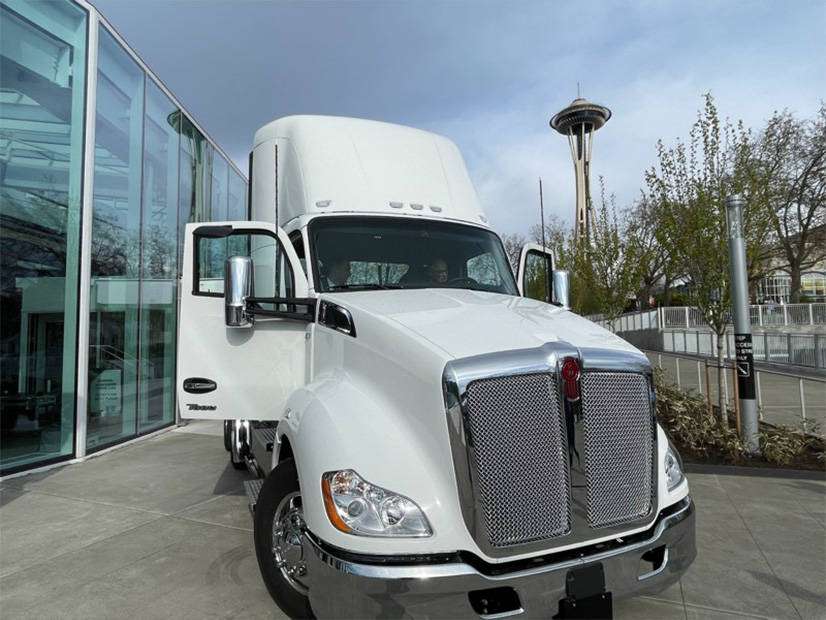
Washington has adopted California’s Advanced Clean Trucks (ACT) program to govern the Evergreen State’s long-term transition to zero-emissions trucks, but a group representing truckers argues the timeline for doing so is faster than is practical for the industry.
Under ACT guidelines, 7% of medium- and heavy-duty trucks sold in Washington in 2025 must be zero-emission vehicles, increasing to 20% by 2028, 30% by 2030, 40% by 2032 and 55% by 2035.
That schedule is too aggressive, according to the Washington Trucking Associations (WTA).
“While ACT is meant to move industry toward zero emissions for medium and heavy-duty (M/HD) trucks, WTA members have concerns about vehicle costs, operational challenges and low to non-existent vehicle adoption,” wrote WTA President Sheri Call in an Aug. 15 letter to Gov. Jay Inslee (D).
Washington does not have the regulatory infrastructure in place to discourage companies from using out-of-state outside trucks that do not comply with emissions-reduction standards, she wrote.
“Artificially manipulating the market to mandate ZEV truck sales will have a profound impact on the industry and lead to unintended consequences,” Call wrote. “California officials wrote, adopted and implemented the ACT program for the state of California. But Washington is not California.”
California has been building support for decarbonization for decades, including funding incentive programs for clean commercial trucks. And its ramp-up of zero-emission sales is more gradual than the Washington schedule, she added. (See Groundbreaking California Clean Truck Rules Win EPA Waiver.)
“A zero- emission truck costs about two and half times more and sacrifices about two and half tons of payload compared to a clean diesel truck today. Electric M/HD trucks also compromise range, while only providing about 150-200 miles per charge,” Call said in the letter. “Fueling infrastructure is also expensive and can take up to two years for permitting and installation. There is also the ongoing uncertainty of electric grid capacity as examples of officials asking vehicle owners to avoid charging cars during hot summer days continue to become more commonplace.”
Call also pointed to the 12% federal excise tax on new trucks and trailers — “a policy the industry has long thought to inhibit adoption of newer, cleaner diesel trucks.”
The ACT’s timeline is too aggressive and does not accommodate innovation or current technological limits, she wrote.
“WTA respectfully asks you and the Legislature to reconsider the link to California’s emission standards and adopt the federal standards that are more suitable to Washington’s unique needs. Washington employers should not have to face policies created by another state, with no input from stakeholders or analysis for its impact here,” Call wrote.
In an email to NetZero Insider, Mike Faulk, spokesperson for the governor’s office, said the state is studying the issue.
“These regulations were thoughtfully crafted to make compliance feasible. There are a variety of compliance options, including giving credit from previous years sales to meet the first target in 2025 and credit-sharing across weight classes allowing for manufacturers to ramp up availability,” Faulk wrote.
“The state is committed to supporting the trucking industry in this transition,” Faulk continued, noting it has provided more than $130 million in funding from the Climate Commitment Act — the state’s cap-and-invest program — to help truck owners cover the costs of electric trucks and charging infrastructure.
“We continue to work with California and Oregon to pursue federal funding to build an electric truck charging corridor along I-5. And we’ve secured over $60 million in state and federal funding to electrify drayage trucks operating in and around ports,” he wrote.
California, Oregon and Washington recently secured $102 million in federal funding for the West Coast Truck Charging and Fueling Corridor project, a joint effort to install a network of chargers between the borders with Canada and Mexico. (See West Coast Truck Charging Corridor Wins $102M in Federal Funds.)


